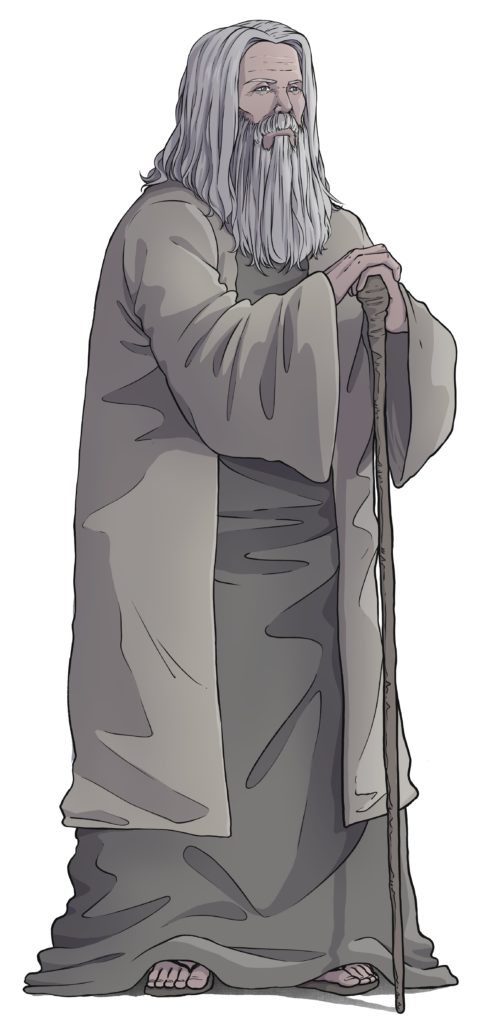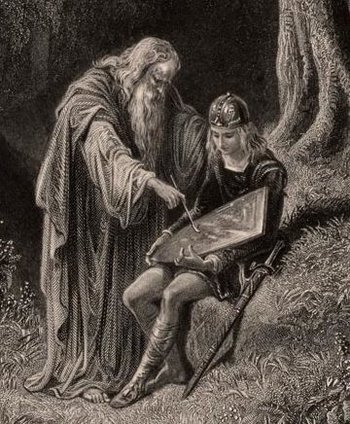Hello! Archie the Sage here. Seeing as how I am trying to build a coalition of the internet’s finest Sages, I thought it best to begin by defining our terms. Just what is a Sage? What are some common misconceptions about them? These next two posts will lay out a blueprint for you that I promise will enrich your life for years to come.

1. Never Stop Learning
In classical philosophy, a sage was someone who had already attained the wisdom which a philosopher seeks. According to Plato, the philosopher (meaning lover of wisdom) is not wise, but possesses the self-awareness that he/she lacks wisdom, and thus pursues it. For this reason, the ancient Greeks held the title of Sage up as an ideal, one that would be very difficult to achieve, if even possible at all.
Here is the problem with that definition. Our brain is hardwired to be constantly taking in more knowledge in an ever-changing environment. We can never know everything, which means we will never achieve some arbitrary “peak” of wisdom where we no longer need to strive for more.
And this thought is echoed by every mentor and teacher worth his or her salt. You may graduate from a prestigious institution. Perhaps you even sat at the feet of great thinkers and leaders of your time! But none of this will give you license to stop educating yourself.
So I would like to propose that Sagehood isn’t a destination to be sought after by the philosopher, but rather, a way of life that is characterized by the never ending pursuit of knowledge, which is then practically applied to a daily path of wisdom.
2. Pursue Virtue and Meaning
When you look at movie characters who are considered the “wise old man,” the “sage,” they seem pretty much have life figured out. Take for example Obi-Wan Kenobi (Star Wars), or Gandalf (Lord of the Rings). Yes, they often have struggles in their lives of biblical proportions!
But have you noticed that somehow they keep a cool head throughout, and in the end they achieve their goals? And did you also notice that you and the rest of the audience are always rooting for them?
This is because their lives are guided by a pursuit of real purpose and meaning, and this has pushed them towards a virtuous course of action. We admire those kinds of people, and we try to be like them! But without Balrogs to slay and evil Sith Lords to thwart, how is the modern Sage to find his meaning in life?
This truism is often attributed to Abraham Lincoln. “Whatever you are, be a good one.” Everyone has their calling, whether it be law or medicine or starting a business or writing poetry. Whatever it happens to be, it is incumbent upon the Sage to pursue his goals with passion, excellence, and truth. You would be surprised at how little you care about the question “what is my purpose,” when you are in full pursuit of it. Beyond that, all the suffering that you are sure to experience in life will be justified if you have that meaning to sustain you and virtue acting as a light to guide you.
3. Think before you speak or Act
We tend to live in the moment, and make quick decisions that we think will benefit us. But here’s a fun little proposal for you. There isn’t just a “you” in the present. There is a “you” from the past, there is “you” a year from now, ten years from now, and “you” that exists in people’s memory long after your death. Imagine the power of reflecting on this truth before deciding what to say or do!
Marcus Aurelius defined the sage as one “who has knowledge of the beginning and the end, and of that all-pervading Reason which orders the universe in its determinate cycles to the end of time”
Here’s a really simple example. It can be tempting to steal something in a store and enjoy the satisfaction of acquiring that item for free. It can also be satisfying to “destroy” someone in an argument. But what if that store has cameras? And what if that person is someone who could have really helped you down the road?
When you consider how your actions will affect you and those around you across all spans of time and points of view, you will make the best decision. In fact, you could say that virtually all of mankind’s self-imposed problems would be solved if they did this.
True, it is impossible to foresee all the potential consequences of our actions. But there’s no telling how much better the world would be if they at least tried to keep this in mind. And you, as the modern day Sage, can set the example in this regard.
4. Embrace Complexity
I once had a mentor who asked me, “Archie, how do you know when a historian has told the truth?” I reasoned in my head for a moment, knowing that in history there are really two key narratives to every story. There is the common tale, as told by the victors and those who have power. Then there is the opinion of dissent, what many would call revisionist history. Finally I told him that it was probably the Historian who found a consensus, the one who could write a history that everyone agrees on.
He coldly refuted me, saying. “No, that is impossible. You can’t find any point in history that everyone agrees on. It is the scholar who has made everyone upset, who tells the truth!”
One thing we know in this world is that people have differing opinions on everything. And it is easier for us, mentally, to take one side or the other and just run with it. It is very easy for us to look at a situation, and label the actors as either horrible monsters or wonderful beyond criticism. In reality, it is always more complicated than that, and taking this into account every time is the key to judging with wisdom.
“But Archie!” You may say, “We all have inherent biases that sway our thinking!” Indeed… We cannot help our genetics or how we were raised. We may always be inclined to think a certain way, and our brains tend to put things into neat little categories for the sake of convenience. Some people have a liberal bend, some are conservative, some are predisposed for religiosity, others for doubt, and the list goes on.
What I am suggesting to you is this. Embrace the fact that every situation you face in life is infinitely more complicated that your first instincts make it out to be. Allow this realization to humble you, and give you a clean slate from which to act. Review ALL the facts, not just the ones that are convenient for you. Only then will you overcome your bias and be a fair person to deal with.
5. Share your wisdom
Here’s an interesting question to ask yourself. Where did all the knowledge and wisdom in the world come from? Did it emerge in a vacuum? Nope. The fact is that everything we know came down to us from people all throughout history who decided to share what they had learned. Now the question is, what will you do once you have educated yourself?
King Solomon of ancient Israel, widely known for his wisdom, interestingly referred to himself as “the congregator” in the book of Ecclesiastes.
“Not only had the congregator become wise but he continually taught the people what he knew, and he pondered and made a thorough search in order to compile many proverbs (Ecclesiastes 12:9).”
This is a fitting way to describe any leader, someone who takes on the responsibility to congregate, to hold people together in pursuit of an ideal and guide them on the right path. Consider all the notable leaders and thinkers you’ve heard of. Socrates, Machiavelli, Gandhi, Benjamin Franklin, etc.. You wouldn’t know a single one of them if they had been silent and never shared their talents. Worse yet, the world wouldn’t have benefited from their contributions to history.
What I am suggesting to you, dear reader, is that you can be a part of this grand tradition. You can live beyond yourself, and even beyond your passing, when you impart your knowledge to others. Maybe you’ll write a book, or start a blog. Maybe you will be the pillar in your community helping friends and family solve their problems. Or maybe, like most people, you will pass on everything you can to your children, so that they can carry on your name in the noblest way possible. Share your wisdom. This is the eternal burden of the sage.
Conclusion
So there you have it! You may have noticed that all these rules are quite general, not to mention bordering on obvious. That’s because they apply to everyone, whether old or young, male or female, rich or poor.
They also aren’t new. In fact, they are in line with the oldest stories of mankind. “Get your life together, seek your adventure, seek knowledge and wisdom, share what you know with others,” it doesn’t get more fundamental than that. But as with all things from antiquity, they lasted this long because there is something of value there. I hope you have found value in what you have heard so far, but believe me, we are only getting started. For now, follow these five tenants, and you may yet become a sage.
So what do you think?
Please share your thoughts below! What do you think of when you hear the term “Sage”? Who is your favorite Sage from history or fiction?
From Athens’ forum to ours. Live wisely my friends. Archie the Sage

